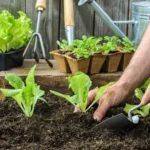Starting a raised garden bed is exciting, but choosing the right filling material is crucial for your plants’ health and growth. Filling it with the wrong materials can lead to poor drainage, nutrient deficiencies, or even harmful chemicals leaching into your soil. Knowing what to avoid can save you time, money, and frustration.
You want your garden bed to support strong roots and vibrant plants, so steering clear of unsuitable fillers is key. Whether it’s construction debris, untreated wood, or heavy clay soil, these common mistakes can stunt your garden’s potential. Let’s explore what not to fill your raised garden bed with to ensure a thriving, productive space.
Common Mistakes in Filling Raised Garden Beds
Selecting the wrong materials for your raised garden bed reduces plant growth and garden productivity. Avoid these common errors to ensure successful soil conditions and healthy roots.
Using Poor Quality Soil or Fill Dirt
Using low-grade soil or generic fill dirt limits nutrient availability and obstructs root development. Soil lacking organic matter, like sandy or depleted dirt, fails to retain moisture. Avoid soil mixed with construction waste or debris, which harms soil structure and plant health. Choose high-quality garden soil or a blend of compost, topsoil, and organic amendments to maintain fertility and aeration.
Avoiding Heavy Clay or Compact Soils
Heavy clay or compacted soils impede drainage and root expansion in raised beds. These soils often become waterlogged, increasing risk of root rot and stunted growth. Avoid pure clay soil and instead incorporate materials that improve texture, such as compost, peat moss, or coarse sand. Light, well-draining soil promotes oxygen flow and protects roots from suffocation.
Steering Clear of Contaminated or Treated Wood Chips
Using treated wood chips or contaminated mulch introduces toxins to your garden soil. Chemicals from treated lumber leach into the soil, potentially harming plants and soil microorganisms. Avoid wood chips painted, stained, or pressure-treated with preservatives. Opt for untreated, natural wood chips or organic mulch to retain moisture without contaminating your raised garden bed.
Materials to Avoid in Raised Garden Beds
Choose materials that support plant health and soil quality. Avoid substances that hinder growth, introduce contaminants, or disrupt soil structure.
Construction Debris and Rubble
Exclude concrete, bricks, asphalt, and other construction waste. These materials raise pH levels and may release harmful chemicals. Sharp fragments damage plant roots and soil aeration.
Non-Biodegradable Materials
Avoid plastics, synthetic fabrics, and rubber. These materials do not decompose, block water drainage, and interfere with soil microbe activity necessary for nutrient cycling.
Lawn Clippings and Weeds Without Composting
Refrain from adding fresh lawn clippings or weeds directly. They contain moisture that promotes mold and disease. They also may harbor weed seeds and pesticides unless thoroughly composted first.
Why Certain Materials Harm Plant Growth
You must understand how unsuitable materials disrupt plant development to protect your raised garden bed. Identifying key problems guides better choices for soil and fill components.
Drainage Issues and Root Health
Poor drainage causes waterlogged soil that suffocates plant roots. Heavy clay soils, construction debris, and plastics inhibit water movement, leading to root rot and stunted growth. Compacted materials reduce oxygen availability essential for root respiration. Maintaining loose, well-draining soil promotes robust root systems and healthy plants.
Soil Nutrient Imbalance
Materials like fill dirt and construction rubble contain few nutrients, lowering soil fertility. Excessive sand or wood chips absorb nitrogen, depriving plants. Non-organic debris disrupts natural nutrient cycles, causing deficiencies or toxic buildups. Balanced, nutrient-rich soil ensures proper uptake and supports vigorous growth throughout the season.
Potential Toxicity and Contamination
Treated wood, construction waste, and some mulches release harmful chemicals that impair plant health. These toxins accumulate in soil and can enter the food chain through edible plants. Introducing untreated contaminants encourages pathogens and pests. Using clean, organic materials eliminates risks linked to soil toxicity and safeguards your garden’s productivity.
Best Practices for Filling Raised Garden Beds
Filling raised garden beds with the right materials ensures healthy plant growth and optimal soil conditions. You must choose components that promote drainage, nutrient availability, and root development.
Choosing the Right Soil Mix
Start with a high-quality soil mix composed of equal parts topsoil, compost, and aeration materials like perlite or coarse sand. Use screened topsoil free from debris and contaminants to avoid compaction and poor drainage. Add compost to supply essential nutrients and improve soil structure. Include perlite or coarse sand for enhanced aeration and water retention balance. Avoid garden soil alone, as it may be too dense or nutrient-poor for raised beds.
Incorporating Organic Matter Properly
Incorporate well-decomposed organic matter such as aged compost or shredded leaf mold to enrich the soil without risking nitrogen depletion or pest attraction. Avoid using fresh manure or grass clippings directly, which can introduce pathogens or weeds and cause imbalances. Mix organic matter thoroughly to create uniform fertility and moisture retention throughout the bed. Applying a 2- to 3-inch layer of mulch on top helps retain moisture and suppress weeds while breaking down gradually to feed soil organisms.
Conclusion
Choosing what not to fill your raised garden bed with is just as important as selecting the right materials. Avoid anything that compromises drainage, introduces toxins, or hinders root growth. By steering clear of unsuitable fillers, you set the stage for healthier plants and a more productive garden.
Your raised bed deserves soil that supports life, breathes well, and nourishes roots deeply. With the right foundation, your garden will thrive season after season, rewarding you with vibrant growth and bountiful harvests.

Hi, I’m Md Rofiqul, a gardening enthusiast who loves spending time in the garden and backyard. I enjoy caring for plants, growing flowers and vegetables, and creating a green space that feels peaceful and refreshing. Gardening is more than just a hobby, it’s a passion that connects me to nature and brings joy to my daily life. Living with plants inspires me to embrace simplicity, patience, and sustainability while making every day more colorful and rewarding.

